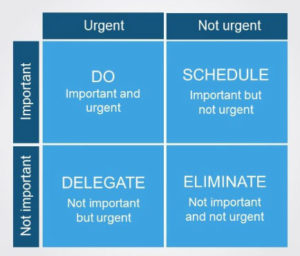For most college students attending competitive schools, the two most important skills they can develop in high school are writing and prioritizing/managing time. This CPE blog has many posts on the former (e.g., Getting the Words Right; see also Search bar in menu at right), so this one is about the latter, especially targeting college-bound seniors, who probably have the greatest fall-semester demands of all high school students.
PRIORITIZING refers to figuring out and balancing what’s most important and most urgent, while TIME MANAGEMENT refers to allocating time according to priorities to maximize bottom-line results. With regard to prioritizing, note that important and urgent are two different things: important might refer to a big paper that counts for a sizable chunk of your quarter or semester grade, but it may not be due for three or four weeks, and hence it isn’t urgent. Conversely, you may have an easy homework assignment or quiz that counts very little toward your grade and therefore not particularly important, but if it’s due or happening next period, it’s urgent.
Balancing what’s important with what’s urgent, i.e., with what’s due next, creates the challenge called time management and it is not always an easy matter to distinguish its two main criteria for students deep in the trenches of scholastic warfare!
A ringing phone, for example, signals urgency since it’s ringing RIGHT NOW, demanding to be answered, but as we all know in the era of relentless spam and cold call marketing, many a ringing phone is completely insignificant. Likewise, a teacher may announce a new assignment or even quiz due at the very next class and so it screams urgency, but the reality from the perspective of college admissions for many juniors and seniors is the assignment or quiz may in fact be the third of fourth most important thing in the big picture you need to do that day. Students who suddenly obsess over a relatively unimportant assignment/quiz at the expense of other, less urgent but more important tasks are doing themselves a disservice. Consequently, it behooves busy high schoolers, juniors and seniors especially, who tend to take the most challenging classes and have the positions of greatest responsibility and time commitment in sports and other activities, to spend some time every morning and/or night figuring out and scheduling their short-, medium-, and long-term to dos with the aid of either a paper-and-pen or an electronic planner.
Juniors probably have the hardest single YEAR in high school when it comes to prioritizing and managing time, but for the college-bout set, there’s nothing that compares to the time demands on fall semester seniors. For them, balancing their top four areas of general focus—earning the best grades they can, taking on leadership roles in activities, preparing for and taking standardized tests, and visiting colleges and writing/finalizing applications—while trying to smel some roses on the path through their culminating year of high school is PARAMOUNT if they want to play the admissions game to the best of their abilities while also having a great senior year.
Much of the work of a senior’s fall semester is deadline oriented. If you have early applications due 11/1 or 11/15 or regular applications due Jan.1, October and December are likely months where writing and polishing applications (along with visiting schools and maintaining relationships with any college reps) will be your top priority and deserves the most time on task. But many students also have to factor in, say, an Oct. 1 SAT, Oct. 22 ACT, Nov. 5 SAT, Dec. 3 SAT, and/or Dec. 10 ACT. Those are longer-term concerns, and therefore not immediately urgent, but they become increasingly so as deadlines draw near because of their potential importance in the admissions game overall. And then, of course, there’s the juggling of classes, assignments, all kinds of extracurricular activity-related events, and the pleasures of being a senior in high school!
Not easy, which is why I take the time to call it to your attention. Before you begin blindly to jump in and work your plan, especially when you’re at your busiest, it’s very important first to plan your work.
We’re here to help!
See also:

